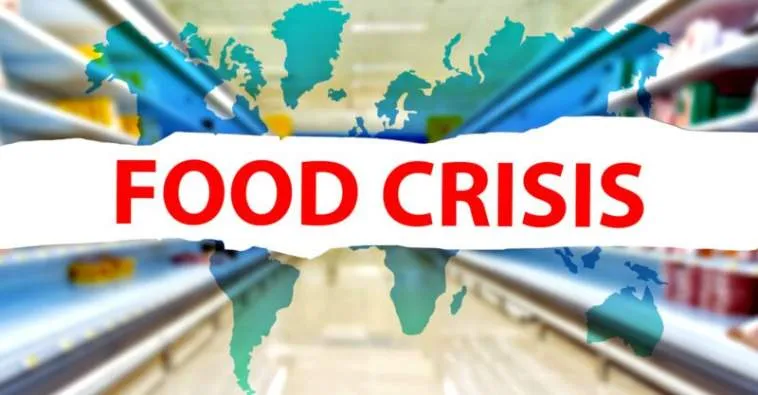(The Defender) Just a few months into the COVID-19 pandemic — and almost two years before global health officials warned of a food shortage crisis — the Rockefeller Foundation issued a report predicting the crisis and offering up solutions, including “shifts to online enrollment, online purchasing of food.”
In a report published July 28, 2020, “Reset the Table: Meeting the Moment to Transform the U.S. Food System,” the foundation described “a hunger and nutrition crisis … unlike any this country has seen in generations.”
The authors blamed the crisis on COVID-19.
The report concluded the crisis would have to be addressed not by strengthening food security for the most vulnerable, but by revamping the entire food system and associated supply chain — in other words, we would need to “reset the table.”
The Rockefeller Foundation called for this food system “reset” less than two months after the World Economic Forum (WEF), on June 3, 2020, revealed its vision for the “Great Reset.”
Some of the contributors to the Rockefeller Foundation report are WEF members; a few of which, along with other proponents of “resetting the table,” also have ties to entities pushing vaccine passports and digital ID schemes.
Rockefeller Foundation: ‘changes to policies, practices, and norms’ are needed
The WEF describes the Rockefeller Foundation as a “science-driven” philanthropic organization that “seeks to inspire and foster large-scale human impact that promotes the well-being of humanity around the world” and which “advances the new frontiers of science, data, policy and innovation to solve global challenges related to health, food, power and economic mobility.”
In the foreword to its 2020 “Reset the Table” report, foundation President Dr. Rajiv J. Shah, who is a former administrator of the U.S. Agency for International Development (USAID), states:
“America faces a hunger and nutrition crisis unlike any this country has seen in generations.
“In many ways, Covid-19 has boiled over long-simmering problems plaguing America’s food system. What began as a public health crisis fueled an economic crisis, leaving 33 percent of families unable to afford the amount or quality of food they want.
“School closures put 30 million students at risk of losing the meals they need to learn and thrive.”
The report did not explain how the Rockefeller Foundation was able to know about this food crisis mere months after the pandemic took hold — especially as the report states it was developed out of “video-conference discussions in May and June 2020.”
The report also didn’t provide any insight into the role pandemic countermeasures such as lockdowns — which the foundation championed along with the WEF — played in contributing to the food crisis..
In its report, the Rockefeller Foundation proposes a series of solutions, derived from “dialogues with over 100 experts and practitioners.”
One recommendation calls for moving away from a “focus on maximizing shareholder returns” to “a more equitable system focused on fair returns and benefits to all stakeholders — building more equitable prosperity throughout the supply chain.”
This may sound like a good idea, until one considers “stakeholders” in this case refers to “stakeholder capitalism” — a concept heavily promoted by the very same large corporations that have been beneficiaries of the shareholder capitalist system.
The WEF also heavily promotes “stakeholder capitalism,” defining it as “a form of capitalism in which companies seek long-term value creation by taking into account the needs of all their stakeholders, and society at large.”
For some context, economic fascism, as personified by the regimes of Nazi Germany and fascist Italy, encompassed government-mandated “partnerships” between business, government and unions organized by a system of regional “economic chambers,” and a philosophy where “the common good comes before the private good.”
It is, of course, unclear how the “needs [of] society at large” are determined — or by who.
The Rockefeller Foundation report declares, “Success will require numerous changes to policies, practices, and norms.”
What does such “success” entail? The report names three main objectives:
- Data collection and digitization: The report calls for “shifts to online enrollment, online purchasing of food, direct farm-to-consumer purchasing, telemedicine, teleconsultations, as well as [broadband access that is essential to] education, finance, and employment.”
The report describes the lack of universal broadband access in this context as “a fundamental resiliency and equity gap.”
- “Stakeholders” working together with the goal of forming a “collaborative advocacy movement.”
- “Changes to policies, practices and norms,” which the report says would be “numerous.”
These objectives, dressed up in “inclusive” language, are further described in the report as being beneficial to human health, ensuring “healthy and protective diets” that “will allow Americans to thrive and bring down our nation’s suffocating health care costs.”
The report goes as far as to describe this as a “legacy” of COVID-19, even predicting that doctors will “prescribe” produce for patients.
According to the report:
“One of Covid-19’s legacies should be that it was the moment Americans realized the need to treat nutritious food as a part of health care, both for its role in prevention and in the treatment of diseases.
“By integrating healthy food into the health care system, doctors could prescribe produce as easily as pharmaceuticals and reduce utilization of expensive health services that are often required because of nutrition insecurity.”
But as Dr. Joseph Mercola pointed out, despite this purported emphasis on healthy, nutritious food, the words “organic,” “natural” and “grass fed” do not appear in the report.
What does appear is the phrase “alternative proteins,” in this case referring to proteins derived from the consumption of insects — another concept promoted by the WEF.
In 2021, for instance, the WEF published a report titled “Why we need to give insects the role they deserve in our food systems,” suggesting that “insect farming for food and animal feed could offer an environmentally friendly solution to the impending food crisis [emphasis added].”
Yet again, an “impending food crisis” is forecast, which may lead some to ask how entities such as the Rockefeller Foundation and the WEF even knew what was coming.
As stated by Mercola:
“COVID was declared a pandemic March 11, 2020, so by the time this Rockefeller report was published, the pandemic had only existed for four months, and while certain high-risk groups did experience food insecurity, such as children whose primary meal is a school lunch, widespread food shortages, in terms of empty shelves, were not widely prevalent or particularly severe in the U.S.
“It seems nothing escapes the prophetic minds of the self-proclaimed designers of the future. They accurately foresee ‘natural disasters’ and foretell coincidental ‘acts of God’. They know everything before it happens.
“Perhaps they truly are prophets. Or, perhaps they’re simply describing the inevitable outcomes of their own actions.”
Mercola suggests such crises are inevitable because they are part of “an intentional plan” by the very same actors.






